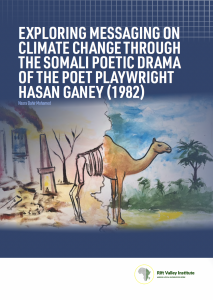EXECUTIVE SUMMARY
This paper delves into the realm of climate change through an exploration of the Somali poetic drama of Hasan Ganey, focusing specifically on the Calamities are the Best Educators in the Globe drama, performed in 1982 by the renowned Waaberi group. The objective of this paper is to investigate the reasons behind the effectiveness of this drama in mobilizing awareness around climate change and how theatre serves as a tool for community awareness among Somalis. By incorporating discourse analysis, this paper aims to shed light on the unique aspects of Somali poetic drama that contribute to its successful dissemination of climate change messages. The research findings show that Somalis readily connect with theatre as it aligns with their cultural tradition of poetry, enabling them to develop a deep sense of ownership over the issues being portrayed. Moreover, the use of drama effectively eliminates language barriers, allowing for a broader audience to engage and understand the messages being conveyed. The significance of this paper lies in its contribution to the growing body of research on the role of theatre as a powerful medium for raising awareness of climate change issues. By highlighting the effectiveness of Somali poetic drama in mobilizing community engagement, this paper emphasizes the importance of cultural context and the utilization of local artistic traditions in climate change communication strategies.
Acknowledgements
This paper has been published as a result of Nasra’s training in the Rift Valley Institute’s (RVI) Research Communities of Practice (RCoP) project. The paper therefore reflects the views of the author and not those or the position of the Rift Valley Institute. The RCoP is one of the RVI’s flagship projects that supports the professional development of early career scholars in east and central Africa through training, mentorship and dissemination of research outputs. Building on RVI’s long-term experience and presence in the region, the RCoP is a value-driven project that is built around a community of practitioners and academics with a common interest in the professional development of early career researchers. With funding from the Carnegie Corporation in New York, USA, and in partnership with the Open Society University Network-Hub for Connected Learning Initiatives, the RVI trained 27 early career scholars from Somalia, Somaliland, Ethiopia, the Democratic Republic of Congo (DRC), South Sudan and Kakuma refugee camp in Kenya in the first and second phases of the RCoP project between August 2022 and January 2024.
This report was edited by Catherine Rosemary Bond.
THE AUTHOR
Nasra Dahir Mohamed holds an MPhil in public policy from Ripham International University in Islamabad, Pakistan, dual Bachelors in Political science and international relations from Civil Service Institute, Somaliland, and a BSc in Medical Laboratory from Edna Adan University, Somaliland. She has experience in research coordination, translation, and transcription for various international, local, and government institutions, and Ph.D. students.



